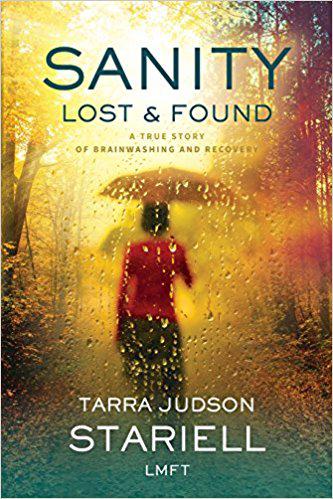Book Giveaway: SANITY Lost & Found by Tarra Judson StariellJune 5, 2018 How do we become victims of our own irrationality? What makes us vulnerable to the predators among us? Why would an otherwise sensitive, intelligent woman allow herself to return again and again to her abuser? How do we stop the erosion of our self-worth? No one wants to suffer, but at times we all do. In what ways can we benefit from difficulties in life? Adversity offers us an opportunity to expand in order to hold or process negative experience. In that process, our consciousness and resilience are strengthened because the situation stretches us beyond our limitations and beliefs about ourselves. Of course, we can choose to ignore or deny the difficulty but if we do so, it usually returns to us in a more aggressive form, eventually demanding our attention. “The squeaky wheel gets the oil or drops off until it gets our attention.” In what ways does fear drive us? Fear is an automatic, neurological reaction to a perceived or real threat. We have three automatic reactions—fight (anger/aggression), flight (fear), or freeze in the face of something our brain interprets as a threat. If we do not down-regulate these emotional reactions, the body continues to operate on “red alert” and our neurology responds accordingly with one of these three options. If we do not become aware of the hyper-aroused status of our nervous system, these neurological defenses will “hijack” our behaviors and we will react in a defensive, non-relational (non-reality based) manner. The executive portion of our brain is not on board as long as the brain senses the need to be defensive. When this happens, our behaviors usually regress to more primitive options. Of course, if there is a real threat, the automatic reactions of fight or flight are helpful in preserving us. The freezing aspect, rendering us akin to “a deer in the headlights”, occurs to prevent the impending danger from hurting us. This is a rational fear situation. In situations that are irrational, the threat is from an earlier history of being threatened that the brain associates with the here and now. If someone is still frozen in that dissociated state of fear, the brain accesses automatic behaviors and the person’s observing self, (mature or adult-self) is not onboard. This is when people become susceptible to brainwashing and/or self-destructive and mob behaviors. How does fear control us? Fear is especially controlling when we allow a past event to become the present reality and react accordingly. Again, the “observing self” vacates and the automatic reactions become the behaviors exhibited. How does trauma manifest itself psychologically? And other than the obvious, is there a difference between the psychological impact of physical and emotional trauma? Physical and emotional trauma impacts us equally. People can also be traumatized by listening to someone else’s trauma—that’s called vicarious traumatization– as when people watched coverage of 9/11, war events, et cetera. Both physical and emotional traumas are felt physiologically. All emotional pain is felt on the physical level—the brain and the body are connected, and what happens to one occurs energetically in the other. Unexpressed feelings get stored in the body and brain in the form of energy. When not moved through the body/brain through some form of expression, unexpressed feelings stay in residence in the brain/body and contribute to emotional suffering, creating anxiety, depression, addictions, and physical suffering when that unexpressed energy metastasizes in the body’s organs. The energy of experiences is processed by our brain’s nervous system which runs all throughout our body. Thus every part of our body has capacity for sensation and memory—be it positive or negative. What is your primary reason for writing SANITY: Lost & Found? I began it for my own healing, as suggested to me by my therapist. Writing is an incredibly valuable tool for expressing out—getting off your chest—feelings, emotions, learning, contemplations, and so on. The best poetry, art, literature has been informed from the mindful experiencing of our life events and then expressing from that place of awareness. I initially decided to enter into the field of psychology to understand my obsessions, how it was that I got so taken over, and why I allowed myself to be so battered and abused. Although therapists typically do not reveal much about themselves for the process of therapy, I have hoped that my experiences could somehow inform people about the subtle processes that we are experiencing today, seducing us further into our own trances of false beliefs and behaviors that are far distant from the natural expressions of our true selves. We live in the illusion that our thoughts and actions are not somehow impacting each other or the planet. That illusion is part of the trance to which many subscribe. The original message I received seemed to be a warning about the fact that humans are not taking responsibility for our actions and the potential for harm when we do not consider that we all are connected, have a shared interest in our home planet and each other—in not judging, attacking, marginalizing or separating ourselves out as better or more entitled than others to their rights. What do you hope readers take from your book? An awakened awareness about themselves, their own thinking and behaviors, as well as more compassion for their own mistakes and failures in good judgment. I would feel very grateful if the exposing of my experiences helps someone understand their own suffering and perhaps offers them a doorway into transforming that conflict into feeling more love and forgiveness for self and others, helping them lead a more grounded and fulfilled life. You left your abuser several times, but always went back. What finally enabled you to cut the cord completely? It took several people giving me the same message, that being subservient and abused by him was not what a God of love would require of me. Instead, that I could in essence “fulfill my mission and serve God” without being in that situation and continuing to do so was really not serving anyone; it was incredibly self-destructive. However, getting to this level of understanding took some time. Being disconnected or dissociated from myself and isolated from people and anyone I knew allowed him to create a new set of values predicating the interpretation of my self-worth. As reality seeped through the dissociative armoring that had shielded me from recognizing how wrong the situation was, what an imposter he was, how misconstrued my thinking had become about my own self-worth, I only needed a paranormal message as a sign that that I was indeed free and would not have to return to him again. Truly, until I believed all that for myself, I was held in an emotional/mental bondage that I could not escape. I could not access my grounding until my perceptions were clear and not clouded by the brainwashing, the effects of all the abuse, and my own mental instability or insanity. You are now a therapist. As a therapist, why do you counsel forgiveness? There is a saying that hating someone is like eating poison and expecting it to kill the person you hate. The reality is that hatred, or any negative emotion for that matter, is poison and will eventually kill the hater, just like the ingesting of arsenic over time will cause the demise of that person much sooner than they would have died naturally. Forgiveness is always resting in waiting at the end of releasing the negative emotions we are harboring inside our bodies and brains. Hurting another or hurting ourselves is destructive; expressing those emotions, although painful at the time of recognizing them, is a much healthier and more worthwhile option. The neutralization of negative emotions, thoughts and feelings is what forgiveness is—the acceptance that what is or what was is just exactly that. We can try and distort that reality by assuming it was not fair, we did not deserve it, and so on, or we can take responsibility for our feelings and get into the present moment and find value in that precious awareness. That is the peace of mind that forgiveness offers us, and of course it is a choice. As an individual who survived abuse, what has forgiveness brought to your life? The most amazing peace of mind and ability to be in my life. Forgiveness for myself has allowed me to accept and love myself, and recognize that I was misled by my own false perceptions and was doing the best that I could at the time. To quote Maya Angelou, “When we know better, we do better.” Forgiveness has also allowed me to love and accept my parents and, of course, others whom I perceived had wrongly treated me. That is quite a burden of negativity that I do not have to carry around anymore. I have truly enjoyed the benefits of seeing my family and others through more benevolent eyes, and it helps me in accepting the present world situation. This is not to say that I am some saint who only sees love and light for everything. Quite the contrary. I am totally human in that I can have a raging ego like everyone else. But I also know that I benefit every time I consciously practice mindful awareness of my emotions and look for a way to accept and forgive. Enter to win the book SANITY Lost & Found by entering the Rafflecopter form below. Ends June 17, 2018 US only please - Good luck. a Rafflecopter giveaway blog comments powered by Disqus SIGN UP FOR OUR NEWSLETTER: 

 
© 2018 Mammanatty. All Rights Reserved. |


  |

